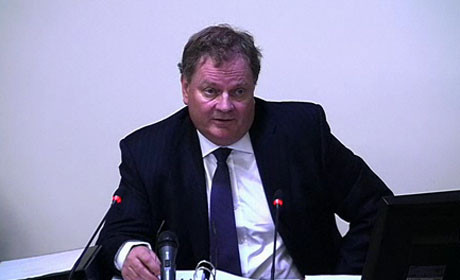Leveson Inquiry: The Guardian and Daily Mail have different versions of the Steve Whittamore story
 THE Mail on Sunday’s editor Peter Wright told the Leveson Inquiry into media standards that reporters from his newspaper continued using convicted private investigator Steve Whittamore after his March 2003 arrest on suspicion of trading illegally obtained information with the press and magazines. Whittamore was investigated as part of an Information Commissioner’s Office investigation into the illegal purchase of confidential information named Operation Motorman.
THE Mail on Sunday’s editor Peter Wright told the Leveson Inquiry into media standards that reporters from his newspaper continued using convicted private investigator Steve Whittamore after his March 2003 arrest on suspicion of trading illegally obtained information with the press and magazines. Whittamore was investigated as part of an Information Commissioner’s Office investigation into the illegal purchase of confidential information named Operation Motorman.
Lord Justice Leveson said:
“Mr Whittamore had collected together a vast amount of personal data.The documents identify the names of titles, specify journalists at the titles apparently or inferentially making the requests. It identifies the names of people from a wide range of public life and in the public eye, and provides addresses, telephone numbers, mobile telephone numbers and charging details for that information.”
The Mail and MoS continued using Whittamore until September 2004. In 2005, Whittamore was was convicted of illegally accessing data and passing it to journalists.
The Press Gazette reports:
In April 2005 Whittamore was given a two-year conditional discharge after he was found guilty of obtaining and disclosing information under the Data Protection Act and received a conditional discharge, though no journalists were ever prosecuted…
In September 2004 [Mail titles] they eventually banned journalists from using him altogether – though two subsequent payments were made after this date which Wright said “no one can quite explain”.
On page 8 of the Mail, the paper explains:

The Guardian approaches the same story from a different angle:
The Mail on Sunday continued to use a private investigator after he was charged with illegally obtaining private information including criminal and medical records, the paper’s editor has admitted at the Leveson inquiry…
However, Wright told the inquiry he did not know until August 2011, when the paper was given access to the information commissioner’s Operation Motorman files, that Whittamore had been obtaining information he was supplying to the Mail on Sunday illegally and that “nobody had suggested” that he was doing anything other than legitimate research for the paper.
He was used up to 2004 because he had databases of publicly available information such as electoral registers and was so efficient at tracing people’s telephone numbers and addresses, at a time when reporters had laptops but no internet access. “I don’t think it occurred to anybody that he might be doing illegal things,” said Wright.
And:
In early 2004 suspicions were raised because of the information commissioner’s Operation Motorman investigation and a resulting police inquiry. Wright said he became aware that there may have been an issue relating to a story published in the paper about union leader Bob Crow getting a lift to work during a strike on the back of a scooter.
The story, headlined “Well, how else would Bob Crow, scourge of commuters, get to work?”, was published on 2 February 2003 and was partly based on confidential DVLA information supplied by Whittamore that identified the owner of the scooter.
Wright told inquiry that in early 2004, after concerns were raised about the Crow story, he checked invoices of payments to Whittamore, which were “very vague” about what exactly the private investigator had been doing for the paper.
“I was uncomfortable that it appeared he might be using methods of which we would not approve, without the knowledge of those who were commissioning him,” Wright said.
Only then wer the invoices checked?
He added that from the extent of the payments to Whittamore it also seemed clear that he was being asked to do legitimate information searches “that should have been done by reporters themselves”.
Wright told the inquiry that Whittamore’s notes had logged “that the name of the owner of the scooter had been supplied to us by Whittamore” but he was not aware “who on the newspaper if anyone asked him for this”. “It’s a reasonable assumption that they did, but we don’t know.”
When police raided Whittamore’s offices they discovered he had about 17,000 requests for information from journalists including for mobile phone numbers, car registration plates and criminal records.
The logs formed the basis of the information commissioner’s 2006 report, What Price Privacy, which ranked the Mail on Sunday as Whittamore’s fourth most frequent customer with “266 positively identified transactions” with the private detective…
Wright said he was unaware of the paper’s use of Whittamore, whose invoices were categorised alongside regular journalistic expenses such as taxis and accommodation, until Operation Motorman was brought to his attention.
He denied this was any attempt to “cover up the use of these people”.
Such are the facts.
One question: who trained forem police officer Steve Whittamore?
Posted: 12th, January 2012 | In: Key Posts, Reviews Comment (1) | TrackBack | Permalink


